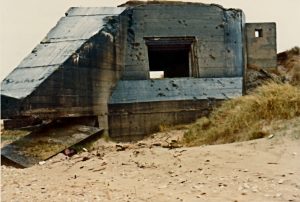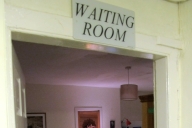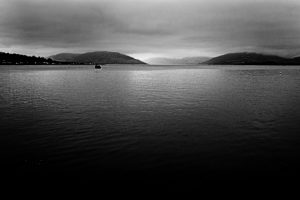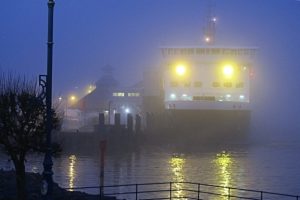We shall be moving house a few days before Donald Trump enters the White House. A small domestic upheaval before a seismic disturbance of historical significance.
I fear and loathe Trump, in the same way I feared and loathed the bullies who dominated my life when I was six and seven years old. I was a middle-class boy with the London accent I had picked up from my Londoner parents (they had been exiled to the north of England by the German bombing). I was sent to a primary school largely populated by kids from the slum-clearance estate that had appeared suddenly on the edge of the Cheshire village where I was born. They too had been exiled by the bombing, in their case from the narrow, mean backstreets of central Manchester. Even at this early age they were tough kids, looked it and acted it. Few of them could read or write, many of them thought with their fists or their boots, and a nervous middle-class kid who had a London accent and liked reading books was for them a heaven-sent opportunity. I shed my London vowels as quickly as possible, but I have never been a fighter and nothing could put a stop to the violent class war that broke out around me and on me. (When I was eight I passed an entrance exam and was moved to a different school.)
Trump reminds me unfailingly of those troubled and inadequate kids, who saw me, and a handful of others like me, as some kind of threat to however it was they dimly and narrowly interpreted the world. Trump is my enemy, in the same way as those louts were my enemies. He is inexperienced, ignorant and crude. He is a sex offender, an abuser of women, a mocker of people with disabilities, a racist. He is culturally bereft. He clearly lacks the capacity for imaginative thought, for subtlety, diplomacy – or any kind of structured decision-making. Worst of all, he actually sees these major personality flaws as qualifications, as character qualities that give him the right profile to be president of the most powerful nation on Earth.
The prospect of this appalling man having any kind of political power, even for a short time, is terrifying. No good can come of it, and although in the past I have worried intensely about political leaders, and suffered by their policies – Margaret Thatcher, the Bushes, Vladimir Putin, Ronald Reagan – with hindsight the threats they represented seem laughably trivial compared with potential for the economic, political, social and military chaos that is likely to result from the bizarre prejudices and confusions of the offensive and disgusting Trump.
Our move away from Devon is not directly connected with Trump, of course, but our decision to move came after the full impact of the depressing Brexit vote began to sink in, and while Trump’s revolting election campaign was at its height. Maybe these two signal events of 2016 had an influence on our choice, but we maintain our motives are positive, not an instinct to try to flee. Devon is itself something of a refuge, of course, a place of presumed safety some people move to as an escape from the harsher realities of the modern world.
We have been happy in Devon: the landscape in particular strikes a resonant chord in me. To most people who live in Britain and who travel to the west country, Devon is a sort of rural prelude to the more commercially adept resort areas of Cornwall. There is nothing much in Devon: there are two big cities, Exeter and Plymouth, but neither of these is on the same sort of scale as the major cities of Britain, and both are well contained within their localities. Exeter in particular is a compact, attractive town. There are a few other smaller towns, but most of Devon is countryside: farms, woods, moors, river valleys, wild coastline. It is peaceful and beautiful, and although such passive countryside is openly vulnerable to exploitation, so far it has been left more or less undamaged by industrialization, by commercial enterprises, by intrusive housing developments, by the unwanted construction of trunk roads. It has not been entirely spared these modern features, but there are still large areas of the Devon countryside that have not substantially changed in centuries.
It has to be fought for. Housing estates are appearing on the edges of many villages, bringing dull modern designs to places better known for cob cottages and thatched roofs. Supermarkets are being built in many of the market towns. Even the one true wilderness in the heart of Devon, Dartmoor National Park, is at risk – many of the off-road tors are now being indelibly streaked with wide and muddy tracks created by trail bikes and ATVs, which are in any event a noisy nuisance to walkers. None of this is the reason we are leaving, because this is the modern world and people have to live somewhere, and anyway so far the damage is not irreparable.
The house we are leaving is situated on high land close to the valley of the River Taw. This meanders calmly between hills, through its flood plain, free of pollution, rich with fish, animals and birdlife. Not far from this is a tributary, the River Mole, flowing down from Exmoor to Kings Nympton, where it joins the Taw. In its comparatively short length the Mole has four of its own tiny tributaries, all more or less unknown outside the locality. They have lovely names: the Yeo, the Crooked Oak, the Bray, the Little Silver Stream.
Of any of this, Donald J. Trump knows nothing. He sees land as something to be bought and developed: he has purchased two golf courses in Scotland. (One of them was already there, but after a lengthy battle with local people and environmentalists he built the Balmedie course on formerly undeveloped coastline near Aberdeen, a bird sanctuary and a marine landscape of dunes and wild beaches.) He believes climate change is a hoax, played by China on the USA to make Americans lose their jobs – he has said that on taking office he will “cancel” all existing US climate change policies. He has “promised” to restore the torturing of political prisoners. He has discussed the possibility of using nuclear weapons in Europe. He urged gun owners to turn them on his political opponent, Hillary Clinton. He –
I have always loved and admired the USA, but some recent madness has made Americans inflict this inadequate and troubled lout on the world.
For the next two or three weeks we will be packing our stuff, moving our stuff some 800 kms (approx. 500 miles), unpacking our stuff, getting our stuff to work again … we will be off grid for a while. By the time we are back on, well – see above.
Happy New Year!
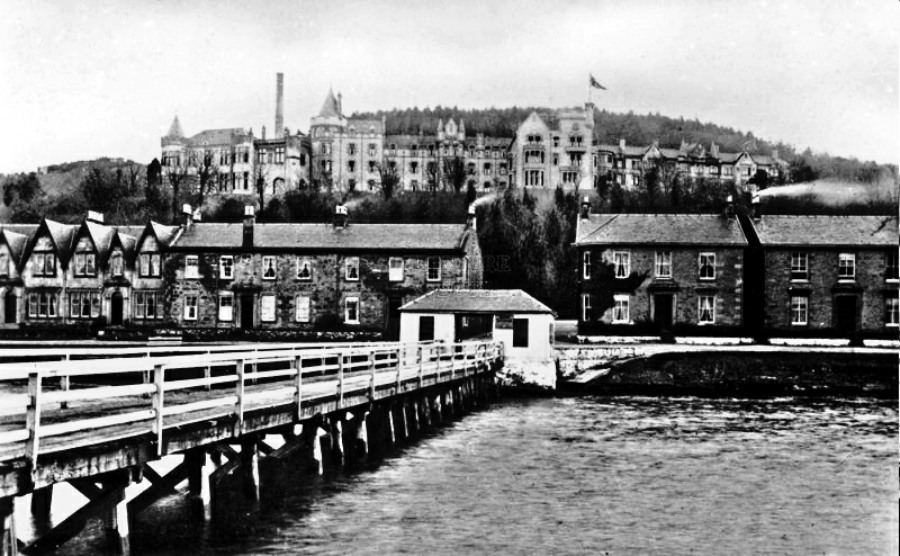
 This is a photograph taken in June 1970, by Margaret, Brian Aldiss’s second wife. Brian had generously invited me down to their house in Oxfordshire to celebrate the publication of my first novel Indoctrinaire. Also there was Charles Monteith, who was not only my editor at the publishers Faber & Faber, he was Brian’s too. He had been responsible for buying and publishing all the early Aldiss books, including those short stories I had admired so much, and the fabulous bravura of Non-Stop.
This is a photograph taken in June 1970, by Margaret, Brian Aldiss’s second wife. Brian had generously invited me down to their house in Oxfordshire to celebrate the publication of my first novel Indoctrinaire. Also there was Charles Monteith, who was not only my editor at the publishers Faber & Faber, he was Brian’s too. He had been responsible for buying and publishing all the early Aldiss books, including those short stories I had admired so much, and the fabulous bravura of Non-Stop.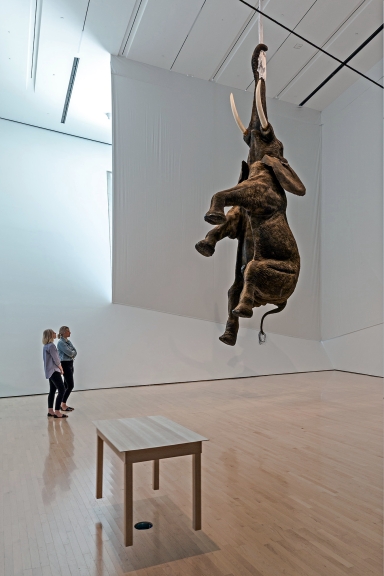 The curator of the exhibition is Marc-Olivier Wahler, previously director and chief curator of
The curator of the exhibition is Marc-Olivier Wahler, previously director and chief curator of 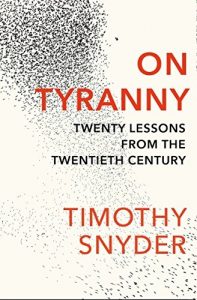 Snyder’s twenty lessons cover some familiar ground, at least in the early pages, but all are written with great clarity. The book gains weight and power as it proceeds. I was particularly impressed by his analysis of the perversion of facts and language, and the Orwellian doublespeak in which journalists, judges, political opponents, senators and almost everyone else are suborned. Even Orwell did not think of “fake facts”.
Snyder’s twenty lessons cover some familiar ground, at least in the early pages, but all are written with great clarity. The book gains weight and power as it proceeds. I was particularly impressed by his analysis of the perversion of facts and language, and the Orwellian doublespeak in which journalists, judges, political opponents, senators and almost everyone else are suborned. Even Orwell did not think of “fake facts”.